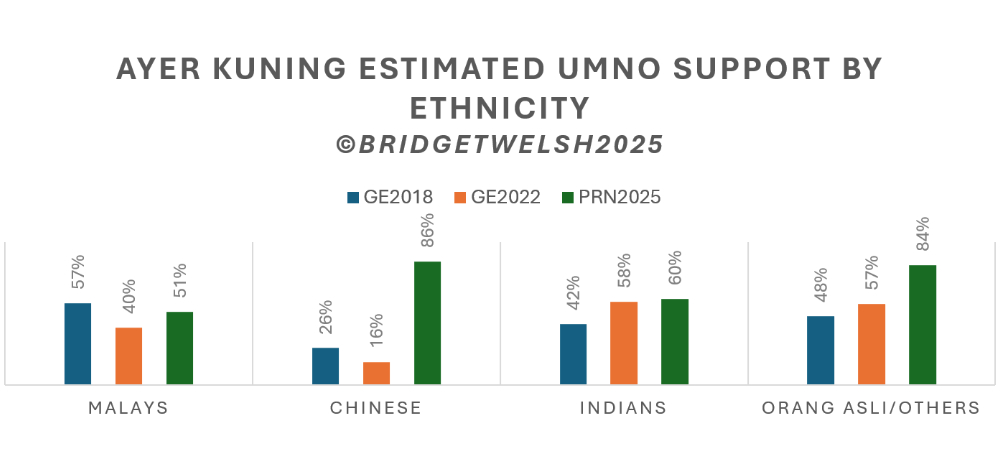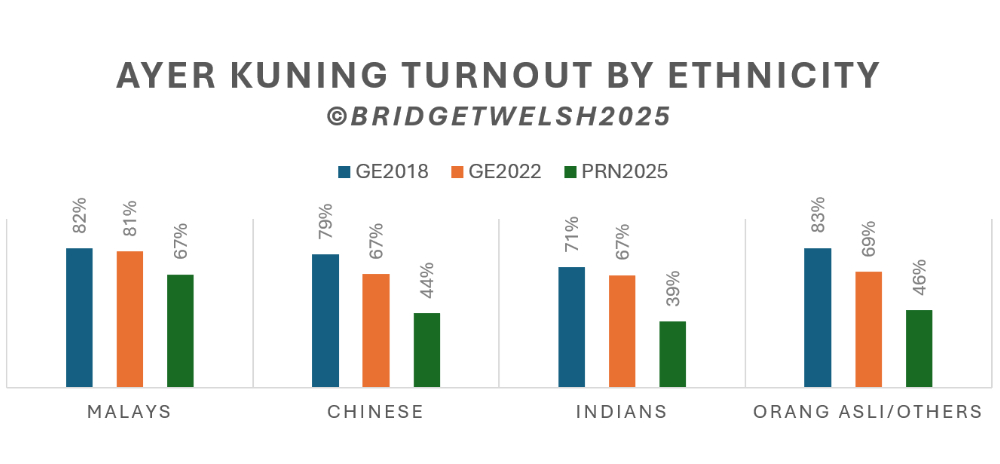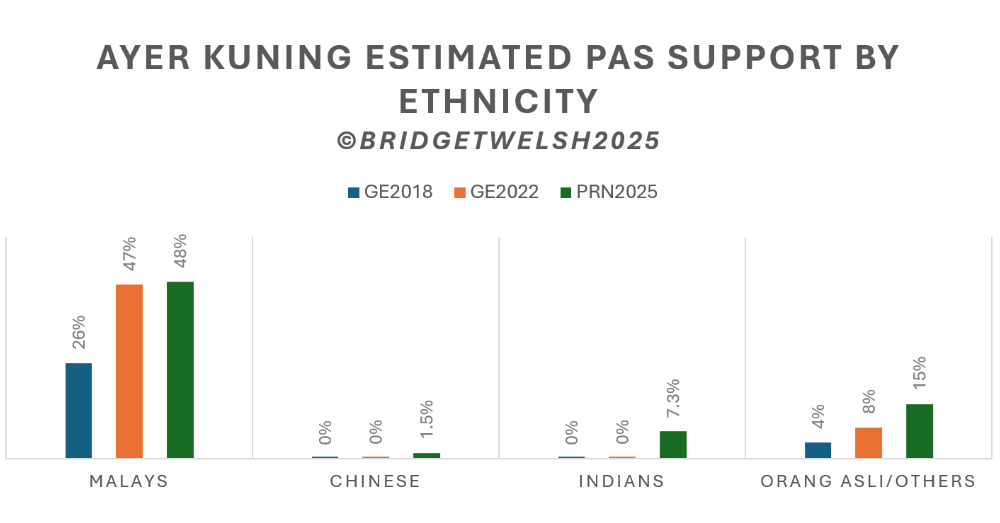As expected, Umno won the Ayer Kuning seat. It gained an increased majority of 5,006 or 27 percent of votes compared to 2,213 votes or nine percent in the 2022 contest.
When the results were announced, there were all smiles, but a closer look at the voting suggests that there are signs for all parties that all is not as well as it seems.
In fact, the findings suggest that there are not-to-be-ignored yellow warning lights.
Before analysing the polling station results, it is important to appreciate that this election is not one for the record books. It was a lacklustre by-election campaign that did not meaningfully deliver goodies to a struggling constituency.
Arguably, the biggest message was one of voter disengagement and frustration. The latter was evident especially among Indian voters, as detailed below.
Re-Umno-isation and limited Harapan-Umno transferability
Let’s start with a look at Umno’s vote. An important question is whether the Madani coalition is having spillovers electorally, whether the collaboration between the Anwar Ibrahim-led Pakatan Harapan and ally Ahmad Zahid Hamidi-led Umno is yielding benefits and, importantly, for whom.
No question, the relationship is contributing to a “re-Umno-isation”, as Umno is being given electoral life from previous Harapan supporters.
There is Umno-saving vote transferability. From an ethnic lens, the findings show that Umno gained support among Chinese and Malay voters who supported Harapan.

The gain among Malays was an estimated 10 percent. This brought the share of Malay support for Umno - in a constituency in the traditional heartland Umno/BN areas of southern Perak - to an estimated 51 percent, short of the estimated 57 percent that Umno won in 2018 but not insignificant.
In terms of Malay support, the party has made modest gains, but it is still far from its previous pre-2018 levels.

The main vote transfer, however, was among the Chinese. Umno’s vote gain was a whopping estimated 70 percent, at least for those who voted, as the share of voters voting dropped precipitously (a point developed below).
To put this in context, the vote share is the highest Umno received from Chinese voters in decades as a result of the Madani - especially DAP - cooperation. The share of Orang Asli votes was also considerable, an estimated 86 percent.
In terms of the outcome, Umno is now increasingly dependent on Chinese support to win seats, to a greater degree than before.
The party is being elected to office with the support of previous Harapan voters, an irony given the political history, but a reflection of current realities.
When PAS opted to base its campaign around pig farming, to attack the livelihood and core food staple of the Chinese community, this sort of result should be expected.

For Umno, however, the greater electoral dependence on Chinese votes raises the bar for better engagement and respect for the community. A return to traditional racialised rhetoric could undercut its current electoral fortunes.
Increasing Indian discontent
By contrast, the Indian share of support for Umno/BN essentially remained the same, with no transferability to the Madani government candidate among those who voted.
Umno, supported by MIC, won only an estimated 60 percent of the Indian vote, suggesting that the MIC delivered its core support but no more.
Without the support of the MIC, the level of support would have been much lower.

Indian voters are looking for other options, with Parti Sosialis Malaysia (PSM) winning an estimated 32 percent of the Indian vote and PAS securing 7.5 percent as well.
The main choice of Indians in Ayer Kuning, however, was not to vote at all; only an estimated 39 percent of Indians turned out to vote, showing that the boycott campaign was effective.
The poor treatment of the Madani government toward the Indian community is yielding electoral outcomes, with anger growing and becoming electorally evident.
Issues have compounded over the past two years, as many feel bullied and their concerns ignored.
More not voting
Another important finding from Ayer Kuning is persistent voter disengagement across communities.
The overall turnout level was 56 percent, a drop of 19 percent compared to GE 2022.
Turnout levels for non-Malays dropped precipitously, for Chinese (23 percent), for Indians (28 percent), and for Orang Asli/Others (23 percent).
Less than half of these communities are coming out to vote, a serious wake-up call to the Madani government of dissatisfaction.
For Umno, the number of voters who transferred support to the party was less than those who chose not to come out to vote at all.
The number of voters that did not turn out to vote compared to 2022 was larger than Umno’s majority. These sorts of findings are not a strong electoral endorsement.

PAS holds on
The findings also show that PAS’ support levels did not decrease. In fact, PAS modestly gained support from voters, especially Indian voters.
Those suggesting that PAS’ support levels have peaked are doing so prematurely, without looking at the actual numbers.
PAS maintained support levels among Malays, an estimated 47 percent in 2022 and 48 percent in 2025.
The party won over an estimated 7.5 percent of Indians and a small number of Chinese at an estimated 1.5 percent share. Orang Asli support for PAS doubled, to an estimated 16 percent.
That non-Muslims are opting for PAS shows a serious level of disenchantment with the Madani government among voters, a protest vote.
PSM’s gain is similarly telling - and important. Non-Malay voters are looking for non-Madani options. The space for alternative parties is widening, although still just a small crack among electoral options.

The persistent support for PAS also comes with a warning for the party, as the findings suggest that PAS is losing support among a key voting group, younger voters.
PAS support among voters under 40 dropped by an estimated 17 percent for those under 30 and 18 percent for those in their 30s, while increasing modestly among those in their 50s.
The significant share decrease is also a product of fewer voters coming home to vote, but the size of the drop points to an emerging trend of PAS losing out on the dynamic and important youth cohort.
Analysis suggests that the pig farm message was hogwash for younger voters concerned with more bread-and-butter issues. Yet, it also suggests that young voters continue to move loyalties to a greater degree than older voters, and that there is more fluidity electorally on the ground.

Warning lights are on
The Ayer Kuning by-election should not engender (over)confidence that all is well. In fact, it should be a lesson that parties need to change how they engage voters.
Voters are increasingly unsatisfied with the electoral options on offer, especially non-Malays and younger voters. There are signs of increased electoral fluidity as voters expect more.
The campaign suggests that messages need to change, to move away from divisive political rhetoric.
Respect for non-Malays needs to improve, from Umno’s appreciation of their growing dependence on Chinese to the electoral losses for PAS when they attack the community.
Malaysians are tired of the old polarising religious and racialised campaigns.
Ayer Kuning suggests that the Madani government may be reaching a point of no return in maintaining Indian support.
The loss of trust is deep and emotive. A meaningful policy programme and genuine substantive engagement are long overdue and urgently needed.
From limited transferability, increasing voter disengagement and persistent and new gaps in the support base of parties, the warning lights are on, and they need to be addressed. - Mkini
BRIDGET WELSH is an honorary research associate of the University of Nottingham’s Asia Research Institute, a senior research associate at Hu Fu Centre for East Asia Democratic Studies, and a senior associate fellow at The Habibie Centre. Her writings can be found at bridgetwelsh.com.
The views expressed here are those of the author/contributor and do not necessarily represent the views of MMKtT.




No comments:
Post a Comment
Note: Only a member of this blog may post a comment.